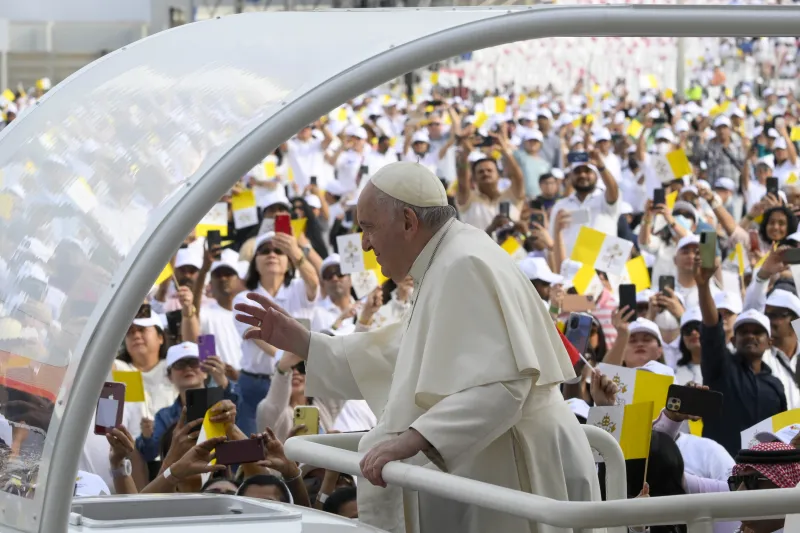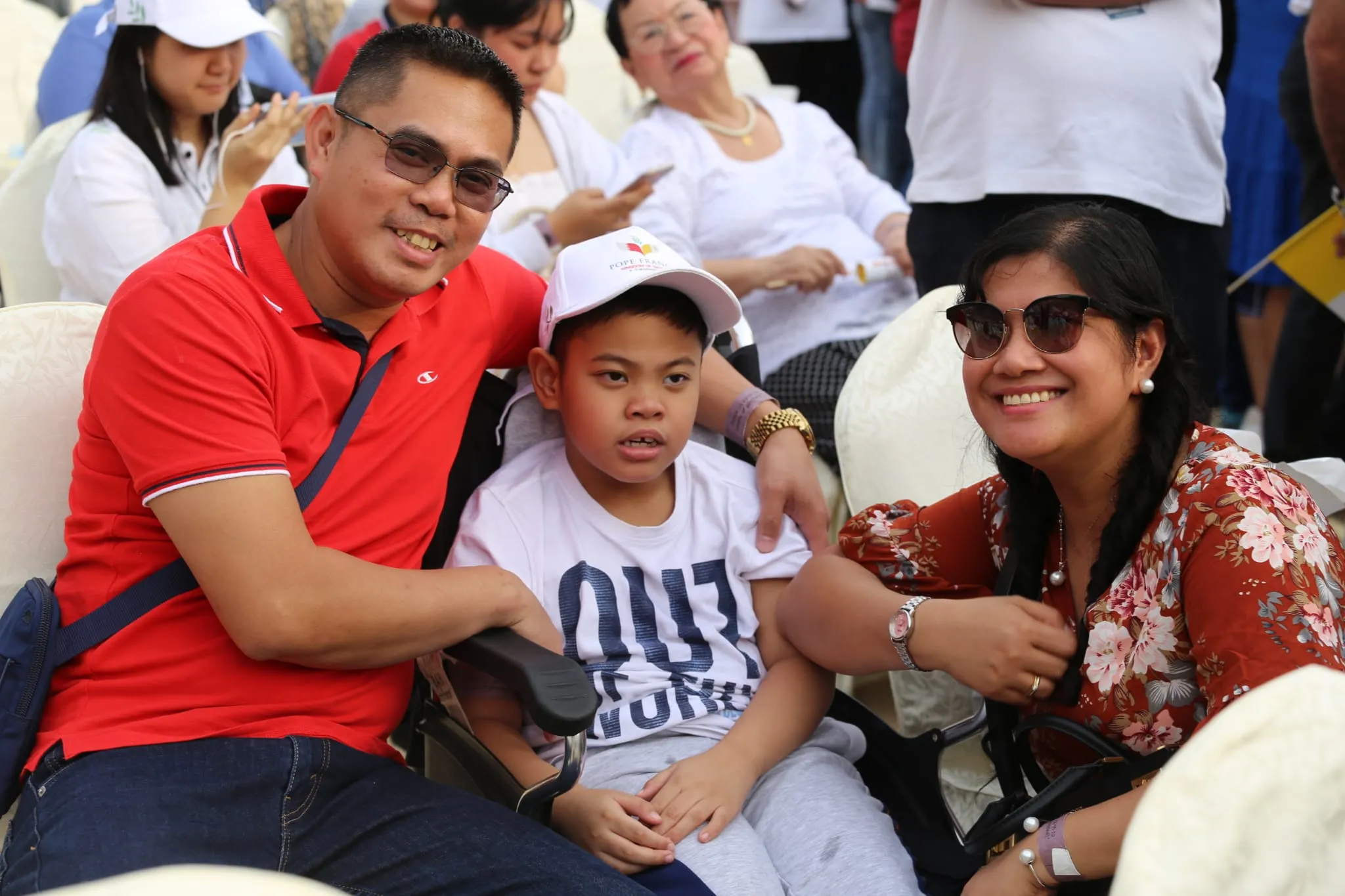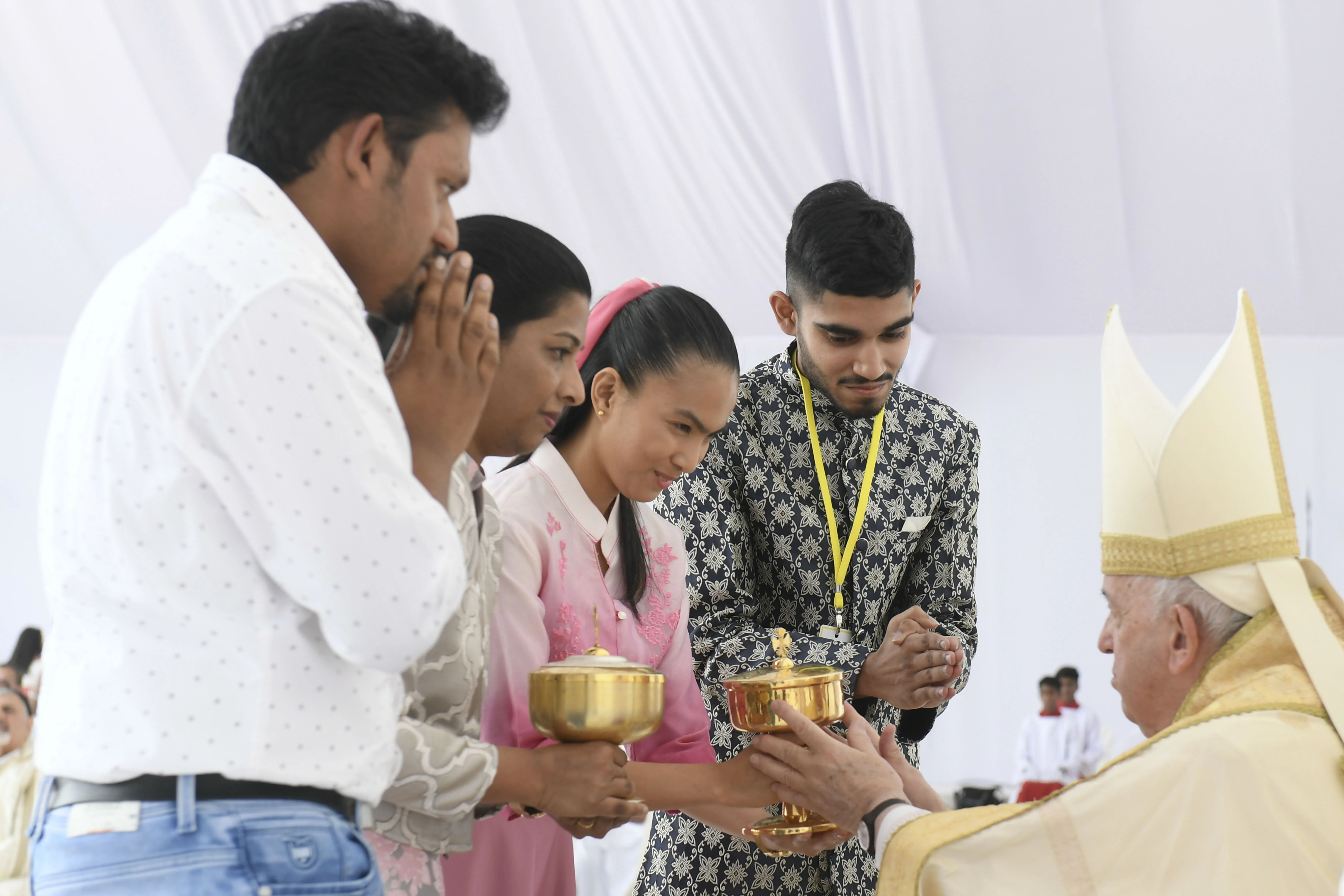
In an exclusive interview with EWTN News, Major Archbishop Sviatoslav Shevchuk, head of the Ukrainian Greek Catholic Church, spoke of the continued need for humanitarian aid in his country and discussed Pope Francis’ peace efforts and the recent controversy over same-sex blessings.
The Ukrainian patriarch was in the U.S. for a week of meetings with public officials and Church leaders to foster renewed support for Ukraine. He spoke with EWTN at the Ukrainian Catholic National Shrine of the Holy Family in Washington, D.C.
Shevchuk emphasized his gratitude to the American people for their support but voiced concern that the U.S. could be tiring of helping Ukraine. He pleaded: “Please don’t give up Ukraine.”
War in Ukraine
Though conveying a “message of gratitude” to the American people, Shevchuk voiced his worry that ordinary Ukrainian people are being forgotten as prolonged political debate over support for Ukraine has delayed action.
As the Ukraine-Russia war hits its two-year mark, there are currently 14.6 million Ukrainians in urgent humanitarian need, according to Shevchuk.
“We cannot say, okay, I’ll eat on the next week,” he said, adding that the Ukrainian Catholic Church “is a main actor in this humanitarian action of assistance to the Ukrainian people, and I can testify that aid cannot be delayed.”
Instead of thinking of the war in political terms, Shevchuk urged the American people to think of Ukraine in terms of its “simple, suffering people.”
“Each day, probably 200 Ukrainians are killed and any delay of the capability to receive the help to protect those people is paid with their blood.”
Reflecting on his personal experience of the war, Shevchuk said that though “nobody is safe in Ukraine,” intelligence reports have indicated that he is one of Russia’s top 10 targets for elimination.
“So, it is dangerous. But that is the mission of each bishop in that time to journey with his own flock,” he said. “From the very beginning, I completely entrusted myself, my life, into God’s hand. Lord, let your will be done. If you want me alive, it means that I have to serve your people. I am still alive, which means that I have a mission.”
“Jesus Christ today is crucified in the crucified body of Ukraine. And we venerate him in the wounds of the simple people,” he said.
Pope Francis
Shevchuk said there is a great desire among the people of Ukraine for Pope Francis to visit the country and that they “are praying” for him to come soon.
Despite this, Shevchuk admitted that the Vatican’s neutrality in the wake of the war “was not very well received in Ukraine in the beginning, because how can somebody be neutral when there is an aggressor who is killing us constantly each day?”
He mentioned Ukraine President Volodymyr Zelenskyy’s 2023 visit to the Vatican, saying that because of the president’s belief that his country “doesn’t need a mediator but allies,” it was “not an easy moment in the relationships between the official Kiev and the Vatican.”
Yet, Shevchuk praised the pope for using his neutrality to help gather humanitarian aid and to work toward peace between Russia and Ukraine. He said that when speaking to Ukrainians about the Vatican’s decision to remain neutral, he makes the distinction between diplomatic and moral neutrality.
“The Holy Father is not neutral in the moral level. He is with us and he confirmed that many times,” he said.
“This neutrality was given as an instrument of searching to alleviate the suffering of the people, and probably in the future some sort of channels of communication for a possible peace agreement,” he added. “So, in a certain sense, we do have a good ally.”
Same-sex blessings
Shevchuk said the Ukrainian Greek Catholic Church has no plans to implement or further discuss the Vatican document Fiducia Supplicans, which allows “nonliturgical blessings” for homosexual couples.
The Ukrainian Church was the first Eastern church under Rome to declare that the document would not be implemented in its jurisdiction.
Shortly after the document’s release, Shevchuk issued a statement in which he said that because the document “does not address questions of Catholic faith or morality, does not refer to any prescriptions of the Code of Canons for the Eastern Churches, and does not mention Eastern Christians,” it “applies exclusively to the Latin Church and has no legal force for the faithful of the Ukrainian Greek Catholic Church.”
“Each Vatican document has a special process of reception in our Church,” Shevchuk explained to EWTN.
“We have our own way to be open to everybody but also how to deliver church blessings,” he said. “In our tradition, we never can distinguish liturgical and nonliturgical blessings.”
“When I grew up, always the sacred space was not limited with the church building,” he went on. “We were taught that Christians are supposed to bring that liturgy of light outside of the church. So, for us, it is very difficult to distinguish nonliturgical blessings.”
He noted that if approached by someone asking for a blessing, he would give it without asking if the person was in a state of sin or if he had been to confession.
“Of course, if somebody will approach me and ask for the blessing, I’ll give the blessing,” he said. “It’s not a moment to inquire in his personal condition as a Christian. But to distinguish so sharply between liturgical and nonliturgical blessing, for us, it’s quite difficult.”
If you value the news and views Catholic World Report provides, please consider donating to support our efforts. Your contribution will help us continue to make CWR available to all readers worldwide for free, without a subscription. Thank you for your generosity!
Click here for more information on donating to CWR. Click here to sign up for our newsletter.









Interesting
We read: “Instead of thinking of the war in political terms, Shevchuk urged the American people to think of Ukraine in terms of its ‘simple, suffering people’.”
And, on the global scale, isn’t this focus on “concrete” cases exactly what motivates Pope Francis? So, what’s the difference when the pope signs off of Fiducia Supplicans while (non-schismatic) Patriarch Shevchuk does not?
Two non-credentialed observations and a question:
OBSERVATION: Is part of the answer given by Pope Francis himself? In a recent interview he confided that if he listened to his multiple critics he would “need the help of a psychologist.” And, in an interview a few years ago, he commented that because confrontation triggers psychological episodes, he has learned not to listen to his critics–the defense mechanism of deflector shields (my wording).
OBSERVATION: Hypothetically, this possible profile is faced with an outside world, or multiple and incoherent worlds, of unprecedented complexity, novelties, metastasized corruption, danger and incalculable downside consequences.
But, might such a personality quirk help to explain a pattern: accommodations as for the sexual revolution (with the mentioned ersatz blessing of irregular “couples”), high appointments given to lapdog clericalists while firing and evicting others as “backwardist,” the linked demotion of the papacy, the episcopacy, and DDF (formerly CDF), the seeming steering of an echo-chamber “synod,” now to be further massaged by ten tutorial study groups, and Fernandez’s theology of simply harmonizing polarities; while admonishing others toward real “dialogue”?
QUESTION: If an embedded personal psychology helps a little to explain the otherwise “confusing” pattern, then—and channeling Shakespeare’s Cassius—perhaps “the fault is not in our pope, dear Brutus, but in the elective conclave.” The late Rene Gerard explored the memetic phenomenon of imitative groups coalescing around a victim scape-goat. What about the reverse, with such herding toward an inwardly-challenged leader to lead in tough times?
What then of the next conclave? How to serve both the “concrete” periphery, and—because “sent” forth (apostello) as guardians of the complete Deposit of Faith—this without peripheralizing what is universal?
“OBSERVATION: Is part of the answer given by Pope Francis himself? In a recent interview he confided that if he listened to his multiple critics he would “need the help of a psychologist.” And, in an interview a few years ago, he commented that because confrontation triggers psychological episodes, he has learned not to listen to his critics–the defense mechanism of deflector shields (my wording).”
Conflict-avoidant. He should never have been elected.
Caught between a form of genocidal warfare inflicted by Russia, a Putin target, a Ukraine president who seeks allies not mediators, and a Vatican with a policy of mediation, Major Archbishop Shevchuk is holding his ground as a spiritual leader who promotes justice. A difficult gambit considering the conflicting interests of the power players.
Loyal to Rome Shevchuk wisely dismisses FS as inapplicable to Eastern Catholics, but nevertheless points out Fiducia doesn’t directly address “questions of Catholic faith or morality”. A Catholic leader who shines in comparison to some others, his appeal to the reality of a people’s needs cannot be refuted. Patriarch of Moscow and all Rus Kirill likely perceives Shevchuk as a threat to Orthodox dominance.
Unfortunately, Archbishop Shewchuk’s answer re: ‘FS’ is rather sneaky. He did not say “’FS’ violates our faith” but played “a Byzantine card”. I understand his difficult situation (especially during the war) but still I think anyone’s duty is to state clearly that ‘FS’ is nothing else but heresy.
Anna, corrupt, but not quite formal heresy…
The gambit is more clever than that. Cardinal Muller discerns that the word game deviously avoids formal and overt heresy, but “leads to heresy.” See link below (and the third from the last paragraph).
And yet, with the inventive approach to the words “blessing” and “irregular couples,” we are indeed reminded of the heresiarch and inspiration, Martin Luther, of whom G.K. Chesterton writes:
“When he quoted a Scripture text, inserting a word that is not in Scripture, he was content to shout back at all hecklers: ‘Tell them that Dr. Martin Luther [read Cardinal Fernandez] will have it so!”
Cardinal Muller’s analysis: https://www.firstthings.com/web-exclusives/2024/02/does-fiducia-supplicans-affirm-heresy
OK, let’s call it “a covert heresy”. That covert or implicit heresy has been a hallmark of the current papacy.
In my paper about ‘FS’ I argued that a covert heresy is far worse than an open one. Because, if ‘FS’ stated openly “the Bible and magisterium got it wrong, blessing of homosexual couples is what God wants” it would be outrageous but much easier to deal with. ‘FS’ created a double bind “we are not doing anything against the Bible and magisterium – now we are blessing homosexual couples”. It is a typical psy-op designed to induce splitting.
I wrote some month ago here that the last heresy will be not about some theological maxima – the last heresy will be a psyche which is an exact opposite to the psyche of Jesus Christ. I.e. it will be a covert narcissist with his eternal need to be perceived as “nice”. In accordance with that pressing need of his he will bend and twist our faith which is “too harsh”. Thus, to be “nice” to homosexuals he will do what ‘FS’ does. But, to be “nice” to the Church’s teaching he is compelled to say that he is not changing anything in the teaching of the Church. He is nice you see.
Hence, the heresy is the person who goes on “processing” the teaching and customs of the Church in accordance with his twisted psyche. Then he spits out disjoint pieces which cannot be put together.
Whoa, a “Byzantine card?” Shewchuk is not being “sneaky,” he’s stating the long held tradition of the Eastern Churches. FS simply does not apply to them, period. I second Fr. Peter Morello’s comment.
An explosion of idiocy. How can we prioritize same-sex blessings given the continuing and increasing slaughter of innocent Ukrainians?
Shevchuk said there is a great desire among the people of Ukraine for Pope Francis to visit the country and that they “are praying” for him to come soon.
Get the hell on with that “visit”. And take with you the heads of modern religions. Protestant Bishops, Rabbis, Imams, etc. Oh, don’t forget the Ayatollahs.
God save the retreating Ukrainan people.
Pope Francis is right that the war must end, that is the best moral ground. Archbishop Shevchuk is a fox.